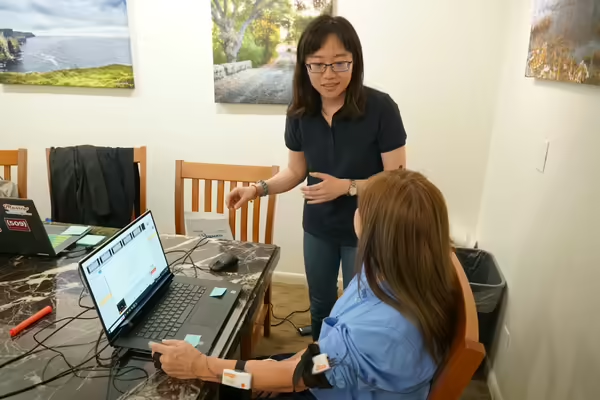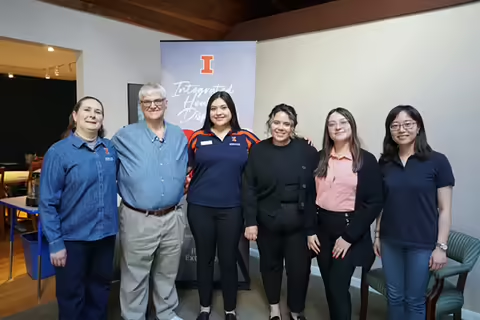
URBANA, Ill. — Vaccines are a crucial line of defense in our fight against infectious diseases, acting as a protective barrier for communities. Yet, even with their demonstrated success, false information and doubts have created an unsettling resistance among some individuals. This hesitancy, driven by widespread myths that spread rapidly, is damaging to public health campaigns and weakens the community-wide immunity that is vital to prevent the spread of infections.
The recent pandemic has also shaped public opinion on vaccines, highlighting their role in disease prevention and the importance of scientific progress. At the same time, it has triggered a global dialogue on equitable access to medical resources, reinforcing the need for reliable information and collective action on healthcare.
EXCITE (Extension Collaborative on Immunization Teaching and Engagement) is a nationwide effort funded by an interagency agreement between the United States Department of Agriculture – National Institute of Food and Agriculture (USDA-NIFA) and the Center for Disease Control. It was created to address the urgent health inequalities that were worsened during the COVID-19 pandemic and have had a more significant impact on communities of color and other minority groups.
EXCITE is committed to improving vaccine uptake in rural and underserved areas by:
- Raising Awareness: Elevating the understanding of vaccines' critical role and correcting misconceptions in communities with high vaccine hesitancy.
- Shifting Attitudes: Building trust and positive views towards vaccines through direct engagement with community members.
- Creating Partnerships: Uniting community groups, health authorities, and educational bodies to increase vaccine accessibility and acceptance.
The EXCITE initiative has been implemented in Illinois, where the University of Illinois Extension is actively engaged in research and outreach activities to address vaccine-related issues and promote immunization education in the state, specifically among minority, rural, and underserved populations.
Dr. Margarita Terán-García and Monserrat Carrillo-Rodríguez from the Illinois Extension's Integrated Health Disparities team are the principal researchers leading innovative methods to address adult vaccine hesitancy within culturally diverse communities.
Implementing the EXCITE initiative in Illinois began with Phase 1 in 2021, primarily focusing on COVID-19 vaccination efforts. In Phase 2, the initiative expanded to encompass various general adult vaccines beyond COVID-19. Phase 3 is currently in the ongoing stage.
"In Phase 3, Illinois Extension is developing culturally tailored messages in multiple languages and educational materials to increase vaccine confidence, specifically among minority, rural, and underserved populations," says Dr. Margarita Teran-Garcia, assistant dean for Integrated Health Disparities programs. "This integration allows Extension to effectively leverage their established community relationships and expertise in disseminating accurate information to combat vaccine hesitancy."
The Neuromarketing Approach to Effective Education
IHD is collaborating with Washington State University, with the support of Illinois Extension’s marketing and communications team, to apply neuromarketing techniques in Champaign. The goal is to create communication content about the human papillomavirus (HPV) vaccine that positively educates and empowers Hispanic and Latino community members, encouraging them to evaluate and seriously consider the potential positive effects of the HPV vaccine for their families and communities.
In the neuromarketing study, participants watched an HPV vaccine awareness video connected to sensors measuring biometric responses, such as eye tracking, heart rate, and facial muscle activity. The findings inform actionable strategies for creating engaging, educational content that empowers community members.
Neuromarketing is a tool that Extension professionals have begun to use to develop, design, and deliver brain-friendly communication content that engages, empowers, and educates community members. Brain-friendly communication content is at the heart of effective educational outreach.
"This is a large part of the project's purpose under Cooperative Extension's broader mission to be a bridge between science and community members," says Dr. Paul Bolls, director of research laboratories at Washington State University. "This approach draws on brain science to gain actionable insights for creating content that resonates and works with how human brains uniquely process and respond to information."
Hispanic and Latino community members will benefit most directly from this project, as this is the community on which it is specifically focused. However, many challenges related to effectively communicating vaccine science to community members are cross-cutting to specific audiences. "The hope is to specifically benefit the Hispanic and Latino communities and simultaneously gain knowledge that can help effectively communicate vaccines to other communities," says Dr. Margarita Teran-Garcia.
"I want to thank the Hispanic and Latino community in Champaign for their valuable contributions; this has been one of the most successful neuromarketing testing projects I have led," says Dr. Paul Bolls. "They, along with the IHD and Illinois Extension marketing and communications team, played a crucial role in the project's success."
The final aim is to create and share vaccine content that empowers and educates individuals, encouraging them to consider scientific information and their values and circumstances when making informed vaccine decisions.
SOURCES: Margarita Teran-Garcia, assistant dean for Integrated Health Disparities programs, Dr. Paul Bolls, director of research laboratories at Washington State University.
CAPTION: Integrated Health Disparities and Washington State University team members working on the Excite-Neuromarketing project.
WRITER: Herbert Chavez, media communications coordinator, Illinois Extension.
Illinois Extension leads public outreach for University of Illinois by translating research into action plans that allow Illinois families, businesses, and community leaders to solve problems, make informed decisions, and adapt to changes and opportunities. Illinois Extension is part of the University of Illinois Urbana-Champaign College of Agricultural, Consumer and Environmental Sciences.
